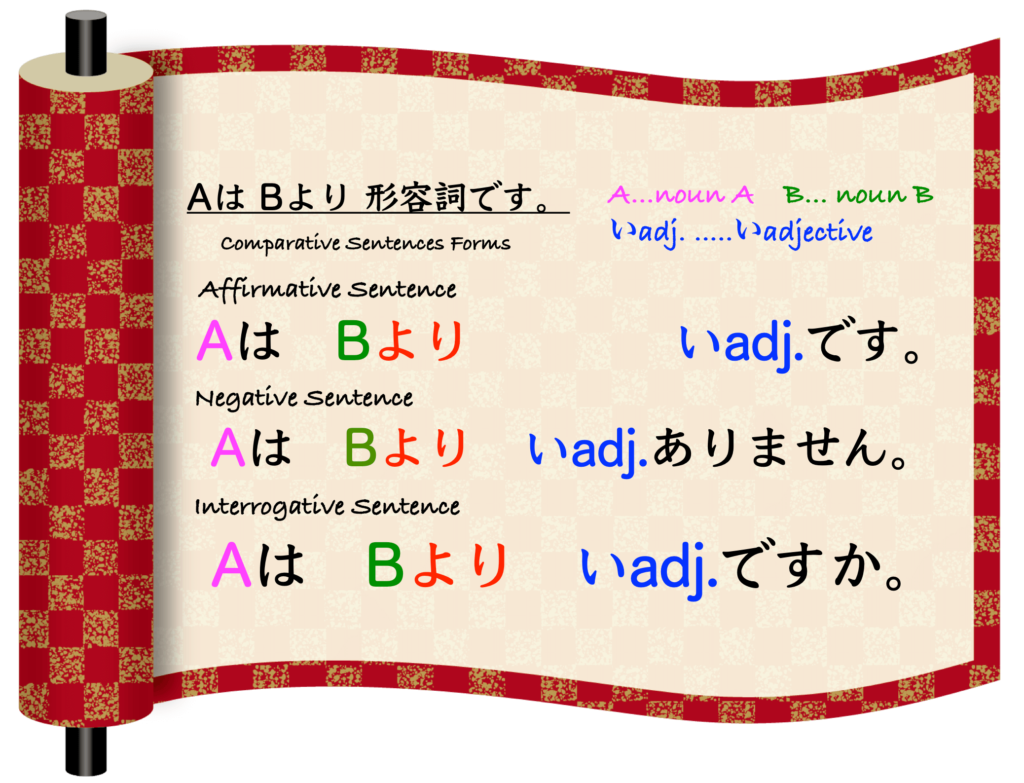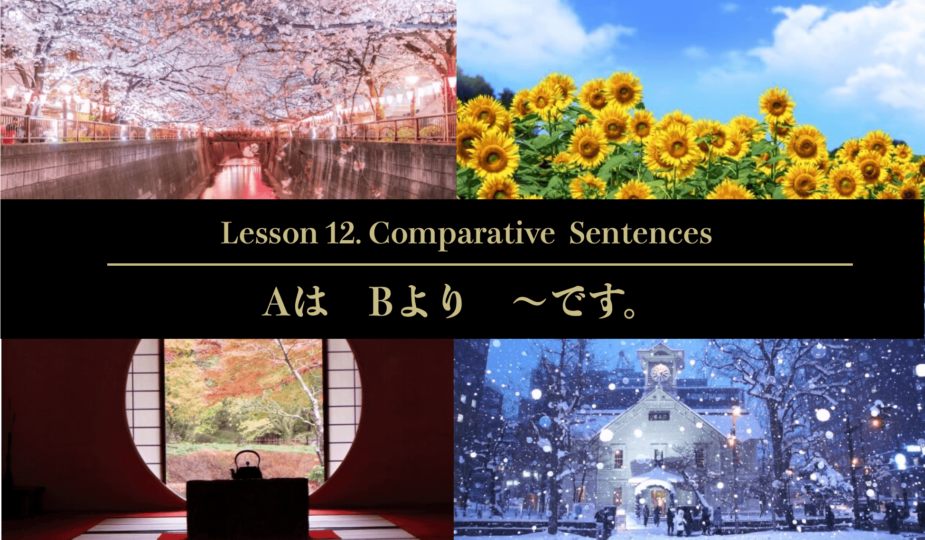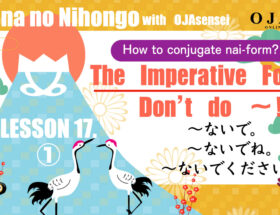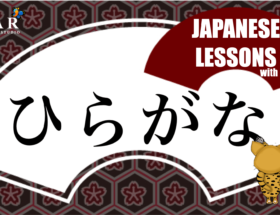Hi, ojachan is here 🙂 Today’s lesson is:【第12課】 Lesson 12. Natsu wa Fuyu yori Atsui desu.
Don’t you want to know how to learn Japanese like Japanese kids? This lesson is meant for students that are beginners at Japanese.
⭐️This lesson is following the textbook “Minna no Nihongo”. (*not perfectly)
⭐️I’m going to give a lesson easier to understand for Japanese learners without following textbook’s orders.
Let’s get started!
CONTENTS
Key Phrases
1. Aは Bより 形容詞です。
Let’s learn comparative sentences today.
Comparative sentences are used for when you compare two items. This sentence might be confusing you about the positions of words that are A or B. If you reverse the positions, the meaning of the sentence could result in the reverse too. Make sure you memorize placing the noun before which becomes the key in the sentence against the comparing word.
■ Basic Forms

| 夏は 冬より 暑いです。 natsu wa fuyu yori atsui desu Summer is hotter than winter. 夏は 冬より 寒くありません。 natsu wa fuyu yori samuku arimasen Summer is not colder than winter. 春と 秋は どちらが 好きですか。 haru to aki wa dochiraga sukidesuka Which do you like better spring or fall? 春です。 haru desu I like spring better. |
■ わたしは Bより Aが 好きです。
If you add a subject, the positions of A and B reverse in this patterned sentence. The noun just before the verb is the key word of the sentence. So be careful.
| わたしは 晴れの日より 雨の日が 好きです。 watashi wa harenohi yori ame no hi ga suki desu I like rainy days better than sunny days. |
■わたしは Bより Aが いいです。
You can use “良い ii” instead of “好き suki”. It sounds more casual. You can use this expression when you want to choose A against B.
| わたしは 晴れの日より 雨の日が 良いです。 watashi wa harenohi yori amenohi ga ii desu I prefer rainy days than sunny days. |
2. Cで Aが いちばん 形容詞です。
Second, let’s learn the superlative sentence. This sentence can tell A is the top level in C group.
| 一年で 冬が いちばん 寒いです。 ichinen de fuyu ga ichiban samui desu Winter is the coldest of the year. |
■ Cで Aが 最も 形容詞です。
You can use “最も mottomo” instead of “いちばん ichiman”. 最も is the positions of A and B reverse in this pattered sentence. more formal word than いちばん.
| 一年で 夏が 最も 暑いです。 ichinen de natsu ga mottomo atsui desu Summer is the hottest of the year. |
3. Aは Bと 同じくらい 形容詞です。
This grammar doesn’t appear in Lesson 12 of “Minna no Nihongo” though, it must be useful for you if you learn it together. “同じくらい” means “equal”.
you can tell A and B are in an equal state with this sentence. But negative form is totally different from affirmative form. So you should learn each two form.
| 1月は 12月と 同じくらい 寒いです。 ichigatsu wa jyuunigatsu to onajikurai samui desu January is as cold as December. 3月は 12月ほど 寒くありません。 sangatsu wa juunigatsu hodo samuku arimasen March is not as cold as December. |
Summary
| 1. A > B | A is -er than B. | Aは Bより いadj.です。 |
| 2.A is the top. | A is the -est of C. | Aは Cで いちばん いadj.です。 |
| 3.A= B | A is as adj. as B. | Aは Bと 同じくらい いadj.です。 |
Vocabulary Words in This Lesson
| 日本語 | ふりがな | pronunciation | English |
|---|---|---|---|
| 季節 | きせつ | kisetsu | season |
| 春 | はる | haru | spring |
| 夏 | なつ | natsu | summer |
| 秋 | あき | aki | fall |
| 冬 | ふゆ | fuyu | winter |
| 天気 | てんき | tenki | weather |
| 雨 | あめ | ame | rainy |
| 晴れ | はれ | hare | sunny |
| 曇り | くもり | kumori | cloudy |
| 気温 | きおん | kion | temperature |
Adjective Words
| い – adjective | ない – form | English |
|---|---|---|
| 暑い atsui | 暑く atsuku | hot |
| 寒い samui | 寒く samuku | winter |
| 涼しい suzushii | 涼しく suzushiku | cool |
| 蒸し暑い mushiatsu | 蒸し暑く mushiatsukui | humid |
| 簡単 kantan | 簡単では kantandewa | easy |
| 難しい muzukashii | 難しく muzukashiku | difficult |
| 面白い omoshiroi | 面白く omoshiroku | interesting |
| つまらない tsumaranai | つまらなく tsumaranaku | bored |
| 近い chikai | 近く chikaku | close |
| 遠い tooi | 遠く tooku | distant |
| 早い hayai | 早く hayaku | early |
| 遅い osoi | 遅く osoku | late / slow |
■「好き」と「嫌い」aren’t verbs?
“好き” and “嫌い”are not verbs but なadjectives.
So these two words are difficult to translate directly into Japanese from other languages, you should be careful.
| 好き suki 良い ii (casual) / yoi (formal) | 好きでは sukidewa 良く yoku | good |
| 嫌い kirai | 嫌いでは kiraidewa | bad |
You can check detail lesson of adjective words HERE↓
Minna no Nihongo 5: Kore wa Yuumeina E Desu【na adjective】
Let’s Practice
Your Homework
✏️Answer these questions in Japanese and comment below.
| 1. 冬と 夏は どちらが 好きですか。 2. 本で 何が いちばん 好きですか。 |
Okay, that’s all for today!
Good luck with your Japanese study 😉
*MINNA NO NIHONGO,VOL.1-W/CD*
| Amazon Reviews: | ★★★★★ |
|---|
Publisher:3 A corporation (2nd Edition)
P.S. My English skill is not enough yet. Please correct me with DM from CONTACT if my English is wrong. Thank you for your cooperation!
Next Lesson is;
Minna no Nihongo 20:Watashi wa Tomodachi ga Hoshii desu
Previous Lesson is; CLICK HERE!
Minna no Nihongo 18: Watashi wa Anata ga Sukidesu










